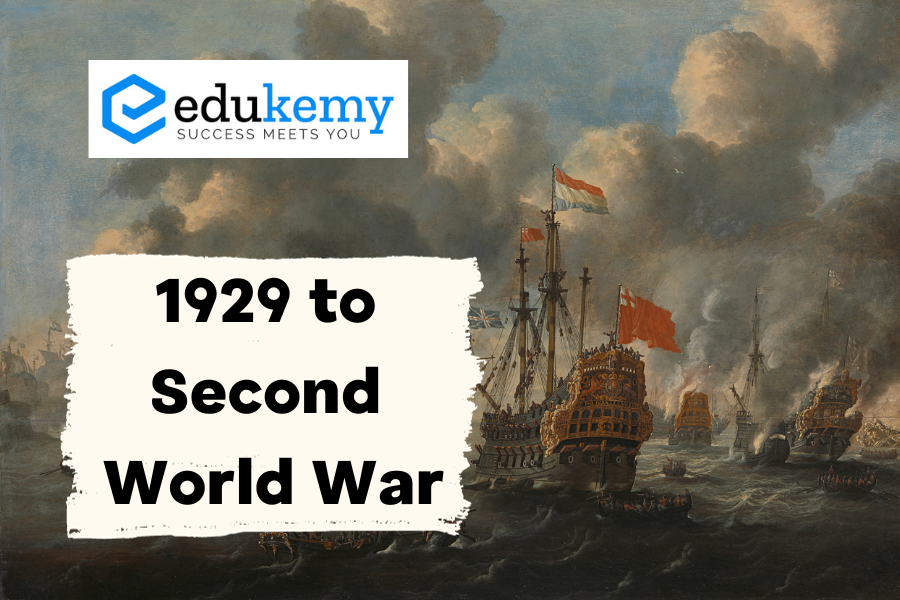
The years following 1929 witnessed significant events and shifts in the political and economic landscape, which had profound implications for the lead-up to the Second World War. Here are some key events and factors during this period:
1. Death of Gustav Stresemann (1929): The death of Gustav Stresemann, the German statesman and Foreign Minister, in 1929 had a significant impact. Stresemann played a crucial role in Germany’s recovery after World War I and in negotiating international agreements such as the Young Plan and the Locarno Treaties. His death left a leadership vacuum and a sense of uncertainty in Germany’s foreign policy.
2. Wall Street Crash (1929): The Wall Street Crash of 1929 marked the beginning of the Great Depression, a severe worldwide economic downturn. It had ripple effects across the globe, leading to widespread unemployment, economic hardship, and financial instability. The economic crisis contributed to the political and social instability in many countries.
3. Rise of Hitler (1933): Adolf Hitler’s ascent to power in Germany in 1933, when he became Chancellor, marked a significant turning point. His rise to power was facilitated by economic instability, political manoeuvring, and the failure of the Weimar Republic to address Germany’s problems effectively. Hitler’s appointment set the stage for the rapid transformation of Germany into a totalitarian state and his aggressive foreign policies that would eventually lead to World War II.
4. Increasing Nationalism: Nationalism and the desire for territorial revisionism were on the rise in many countries, particularly in Europe. This was exacerbated by the economic hardships resulting from the Great Depression, leading to a more aggressive stance on the international stage.
5. Abandonment of Disarmament Efforts: Disarmament efforts that followed World War I, such as the Washington Naval Treaty and various arms limitation talks, faced obstacles and ultimately faltered. This opened the way for an arms race, particularly in Europe.
6. Rearmament in Germany: After Adolf Hitler came to power, he initiated a massive rearmament program in Germany in defiance of the Treaty of Versailles. This significantly altered the balance of power in Europe and heightened tensions.
7. Expansionist Policies: Aggressive expansionist policies, such as Japan’s invasion of Manchuria in 1931 and Italy’s invasion of Ethiopia in 1935, revealed the limitations of the League of Nations in maintaining international peace and security.
These developments created an increasingly unstable international environment and contributed to the growing likelihood of a second major conflict, which would eventually erupt into World War II. The interwar period was characterized by a fragile peace that could not withstand the economic and political pressures of the time.
Contents
- 1 Frequently Asked Questions (FAQs)
- 1.1 1. FAQ: What were the main causes of the Great Depression in 1929?
- 1.2 2. FAQ: How did the Treaty of Versailles contribute to the outbreak of World War II?
- 1.3 3. FAQ: What role did the policy of appeasement play in the lead-up to World War II?
- 1.4 4. FAQ: How did the Dust Bowl contribute to the challenges of the Great Depression in the United States?
- 1.5 5. FAQ: What role did the Battle of Britain play in shaping the course of World War II?
- 2 In case you still have your doubts, contact us on 9811333901.
Frequently Asked Questions (FAQs)
1. FAQ: What were the main causes of the Great Depression in 1929?
Answer: The Great Depression was primarily triggered by the 1929 stock market crash, known as Black Tuesday. Contributing factors included excessive speculation, high levels of debt, agricultural overproduction, and a lack of effective government intervention.
2. FAQ: How did the Treaty of Versailles contribute to the outbreak of World War II?
Answer: The harsh terms imposed on Germany by the Treaty of Versailles in 1919, including territorial losses and heavy reparations, created economic and political instability. This environment provided fertile ground for the rise of Adolf Hitler and the Nazi Party, ultimately leading to the outbreak of World War II in 1939.
3. FAQ: What role did the policy of appeasement play in the lead-up to World War II?
Answer: The policy of appeasement, pursued by Western powers like Britain and France in the 1930s, involved making concessions to aggressive nations, particularly Nazi Germany, to avoid conflict. However, this approach ultimately failed, as it emboldened Hitler and allowed him to expand his territorial ambitions, leading to the escalation of World War II.
4. FAQ: How did the Dust Bowl contribute to the challenges of the Great Depression in the United States?
Answer: The Dust Bowl, a severe drought and soil erosion in the Great Plains during the 1930s, exacerbated the economic hardships of the Great Depression. Widespread crop failures and dust storms led to agricultural collapse, forcing many farmers into poverty and migration, adding to the overall societal strain.
5. FAQ: What role did the Battle of Britain play in shaping the course of World War II?
Answer: The Battle of Britain (1940) was a pivotal air campaign between the Royal Air Force (RAF) and the German Luftwaffe. The RAF’s successful defense of Britain prevented a German invasion, marking a turning point in the war. This victory boosted Allied morale and demonstrated that Hitler’s forces could be resisted, setting the stage for further Allied successes.
In case you still have your doubts, contact us on 9811333901.
For UPSC Prelims Resources, Click here
For Daily Updates and Study Material:
Join our Telegram Channel – Edukemy for IAS
- 1. Learn through Videos – here
- 2. Be Exam Ready by Practicing Daily MCQs – here
- 3. Daily Newsletter – Get all your Current Affairs Covered – here
- 4. Mains Answer Writing Practice – here

